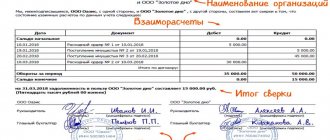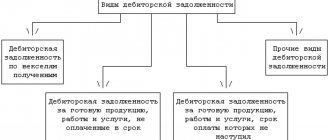How to return accounts receivable
Accounts receivable is the amount of debts that are due to an enterprise from individuals or legal entities as a result of economic relations with them. Such debts are usually incurred from making sales on credit. Sometimes situations may arise in which the buyer/customer does not pay the debt, and then it is necessary to return the receivables, resorting to various methods, which will be discussed below. If you look at it from the accounting perspective, accounts receivable are property rights that are an object of civil law.
Based on the article of the Civil Code of the Russian Federation, “the objects of civil rights include things, including money and securities, other property, including property rights; works and services, information; results of intellectual activity, including exclusive rights to them (intellectual property); intangible benefits."
Provided that a legal entity or individual does not want to repay the loan taken within the period established by the contractual relationship and receivables arise.
If there is a receivable (receivable), whatever its amount, there is a main condition: the faster the receivable is closed by the debtor to its debtor and the faster the services provided are paid for, the better for both parties!
The main goal of the creditor is to carry out a number of activities that make it possible to repay the debt, that is, to repay the debts in the shortest possible time.
In other words, a receivable appears provided that the goods are sold, services are provided in full, and funds are not provided by buyers. That is, receivables are what buyers owe.
This type of debt is called the property of the enterprise, and therefore the enterprise has all the property rights to return the funds belonging to it.
Accounts receivable groups:
- normal receivables are services and goods that are sold, while the seller has received an advance or the payment terms have not yet arrived;
- overdue receivables - the payment deadline for obligations has arrived, but in fact advances have not been made, funds have not been paid. If an assessment is made of the financial condition of an enterprise, its solvency, liquidity, then first of all specialists analyze receivables and payables.
Reinstatement of a written-off creditor's debt
Even when the statute of limitations for the creditor has expired, this does not mean that the company will no longer be able to fulfill the agreement with the client. The Civil Code of the Russian Federation allows you to fulfill obligations even after the expiration of the statute of limitations.
Accountants recognize the write-off to the income of a creditor with an expired statute of limitations as erroneous if there is agreement to close the obligation. But at a time when the statute of limitations has expired, according to the norms of the Tax Code, it is required to recognize KZ as non-operating income.
Tax officials may consider the restoration of the KZ incorrect, since this restoration is similar to a free transfer. However, this can be disputed. Since the restoration of accounts payable after write-off can be used in the form of other justified expenses, for example, non-operating expenses.
How to deal with VAT in this situation? From the amount that was received earlier, the company paid tax to the budget. And the cost, together with VAT, is included in income. Therefore, when restoring a short-circuit, it is better to include the same amount in expenses.
At the end of the limitation period, the short-term claim is liquidated by posting: Dt 62 Kt 91/1.
In a situation where the counterparty has agreed to resume cooperation, it is important to document this.
Upon approval of the agreement, the enterprise acknowledges its debt to the counterparty, and he receives the right to claim the debt at any time. Therefore, adoption will cause a decrease in economic benefits .
Read more: Job responsibilities of a kitchen worker at school
The restoration of written-off accounts payable is reflected by the following transactions:
| Debit | Credit | Operation description |
| Dt 91/2 | Kt 62 | Reflection of expenses |
| Dt 76 | Kt 91/1 | VAT recovery |
| Dt 68 | Kt 99 | Reflection of a tax asset |
Thus, the restoration of accounts payable will not entail negative results for the seller. However, the absence of official letters may lead to doubts during the inspection.
Important! The Client is not allowed to restore expired receivables unilaterally. Therefore, in the case of a bilateral agreement, the best solution would be to formalize the agreement.
Algorithm for the return of receivables
In order to check the reliability of borrowers and obtain reliable guarantees of debt repayment, accounts receivable are monitored. If facts of loan non-repayment arise, the lender needs to begin work on repaying the receivable as quickly as possible. The final result will largely depend on how quickly and methodically the work with the debtor is carried out.
The following are the steps to return receivables:
- Information is collected about the debtor, information about his financial condition is checked, and specialists find out the real reasons for non-repayment of debts. Attempts are being made to identify possibilities for their repayment. In other words, the debtor’s financial condition is re-analyzed to understand the real situation;
- methods of working with receivables are determined: negotiations - independent work - collection of receivables in court - transfer of receivables materials to a collection agency to carry out the collection process;
- planned activities to return receivables are carried out, or cases are transferred to a collection agency.
Methods for collecting receivables
Pre-trial methods
- conduct of negotiations. When conducting
negotiations, specialists remind the debtor that he has debts - unfulfilled obligations. This method can be effective in a simple situation; it helps to obtain payment from the debtor in a short time and at minimal cost;
- writing notification letters. Notification letters and demand letters with messages about the need to return receivables are effective in the initial stages. This method allows you to additionally remind the debtor about the debt, and also shows the seriousness of the creditors’ intentions.
- filling out a statement of claim or petition form;
- preparation of a package of documents with the collection of evidence;
- sitting and hearing the case in court;
- the court's decision;
- work of the bailiff service on the writ of execution.
These letters show the work of creditors to recover debts. These letters, if the case goes to court, will be taken into account in the trial. The letters contain the following information: the amount of debt, the terms and procedure for its return, clauses of the contract that the debtor violates.
The notice letter reminds the debtor of the obligations. The letter of demand contains not only information about the need to make payment, but also information about the actions that may be taken by the creditor in relation to the debtor in the event of failure to comply with the requirements of the contract.
The above methods together are the most effective pre-trial measures for the return of receivables.
Forensic methods
Provided that it was not possible to agree with the debtor on the return of receivables for various reasons, the creditor may go to court.
Steps to collect receivables by going to court:
Judicial methods have their disadvantages:
Provided that the debtor does not have liquid, quickly realizable assets, going to court may not yield positive results. And if the debtor has debts from several creditors, then there is a high probability that the receivables will not be liquidated in full, since the debtor does not have enough funds for everyone, even if the case is won in court.
For overdue receivables, the statute of limitations is established by Article 196 of the Civil Code of the Russian Federation; it is 3 years. Upon expiration of the limitation period, the debt is written off. The statute of limitations may increase, since it can be suspended by law.
The time frame for returning receivables through judicial methods can drag on for several years, usually due to the imperfection of the enforcement system.
The presence of competent specialists will help in the recovery of receivables, even if several years have passed.
Write-off of accounts receivable by court decision
» Contents No organization is insured against violations of contractual obligations by counterparties. Penalties provided for in contracts do not frighten unscrupulous partners and clients if they cannot or do not want to fulfill the terms of the agreement.
And even the court does not always help restore justice and return the company’s debts, the amounts of which “hang” on the company’s balance sheet, unreasonably increasing its taxable profit. Postings to write off receivables can only be made if they are recognized as “bad”.
The formation of non-recoverable “receivables” is a real “headache” for the accounting department and the owners of the enterprise. Not only did the organization receive less of its hard-earned money, it was also forced to include the amount of debt in the calculation of net profit and pay taxes based on inflated figures. Thus, defaulted debts distort the picture of the financial situation, and the creditor company is interested in writing them off as quickly as possible.
But this can only be done after all legal ways to collect the debt from the debtor have been exhausted.
Debts are considered bad on the following grounds: The statute of limitations on the debt has expired. According to Art. 196 of the Civil Code of the Russian Federation, it is 3 years, provided that during this period the organization did not go to court and the debtor did not take any actions confirming the recognition of the debt. The recognition of claims by the debtor is evidenced by any, even penny, payments on existing debt, signed reconciliation reports, written responses, etc.
From the moment any of these actions are committed, the limitation period begins to count anew. It is not possible to collect the debt for objective reasons: the debtor company no longer exists, has been declared bankrupt and its assets are not enough to pay creditors during the liquidation process.
It is necessary to substantiate the unreality of collection with documents: an extract from the Unified State Register of Legal Entities on the closure of the debtor, a court decision on liquidation, a notice of the lack of company property to satisfy all requirements and other official papers.
Repayment and recovery of receivables and payables (postings)
› › › Every year, demands for reliability and correctness of financial statements become higher. Requests for displaying deferred expenses, reserves and estimation requests have become different.
Absolutely all important reporting data is subject to careful consideration. First of all, these are (DZ) and (KZ).
It is necessary to monitor the company's accounts payable, track the timing of obligations, constantly work with accounts receivable, write off overdue amounts in the financial statements, and also take into account debts in the structure of income and expenses in tax accounting. Accounts receivable is one of the shares of an enterprise's working capital.
These amounts represent the number of liabilities owed to the company. Repayment of accounts receivable is the payment of amounts of obligations that an organization owes from individuals and legal entities as a result of economic interactions.
You should understand the difference between writing off and paying off accounts receivable. - this is an attribution to the financial result, or to another indicator, of debt that is not repayable. The posting of repayment of receivables will look like this: Dt 51 (52) Kt 62 - repayment of receivables by buyers for purchased products.
Accounts receivable can be managed by stimulating buyers to repay debts early. Accounts payable is an obligation of an enterprise to other organizations - creditors.
Most often, the debt is a debt to suppliers, employees of the organization (wages), the budget, extra-budgetary funds, loans, etc.
This debt is repaid if:
- fulfillment of a debt obligation;
- written off as unclaimed.
can be performed in the following cases:
- it is impossible to fulfill the obligation (reorganization of the enterprise or inability to collect the debt).
- if the statute of limitations has passed;
We recommend reading: Can I be denied time off at my own expense?
Repayment of accounts payable entails its reduction.
Involvement of collection agencies
They resort to the help of collection agencies in cases where they cannot repay the debt on their own.
In this case, professionals who have certain abilities and have professional skills in these matters work with debtors. This method of debt recovery is an alternative to going to court. Using the services of collection agencies, creditors can receive professional support in solving the above problems in a fairly short time. Specialists from such agencies help carry out all necessary activities and develop the required documentation to improve the level of work with debtors.
From all that has been said, we can conclude: any of the methods requires professionalism in the collection of receivables and specific knowledge in this area. It is necessary to pay special attention to compliance with the legislative side of the issue, so as not to harm the creditor himself.
Arbitration lawyers and advocates:
Details
Arbitration Court in St. Petersburg
Negotiations Defense in court Experienced lawyers
Assistance from experienced lawyers in arbitration disputes. Extensive work experience, consultations, travel for negotiations.
Return of accounts receivable
Return of receivables through arbitration court
Accounts receivable
Receivables of an organization, arbitration for collection of receivables
Claim in arbitration court
Drawing up and analysis of arbitration claims, collection of evidence, petitions to arbitration
Return of accounts receivable from previous years
Its accounts receivable were recognized as uncollectible and written off from the balance sheet at the expense of the created reserve.
Reflection of transactions in the accounting records of Alpha LLC:
Debit 63 Credit 62
— the debt of Omega LLC was written off at the expense of the created reserve. For tax purposes, the same amount will be written off from the created reserve in September.
Previously written off unclaimed receivables have been credited, what entries should be made?
Postings of receivables-positive bonds
Accounts receivable represent the property claims of an organization for long-term repayment of which is expected no earlier than a year or more after shipment. To take into account the amounts of written off accounts receivable in tax expenses, the amounts and ...
What primary documents need to be drawn up “previously written off unclaimed receivables have been credited to the account”?
Operating activities involve the creation of accounts receivable. However, if collection is unrealistic, it must be written off. Carrying out tax accounting to write off debts of debtors that will definitely not be repaid is used...
Tell me the posting: Funds received from customers that were previously written off as bad receivables
Write-off of receivables is carried out in accordance with the provisions and requirements of the Instructions on Budget Accounting, approved by Order of the Ministry of Finance of Russia dated December 30, 2008 N 148n, hereinafter referred to as Instruction N 148n.
Correspondence of accounts for the recovery of accounts receivable from previous years
Did you write her off? Write the postings.
Accounting for accounts receivable. Since 01/01/2000, the procedure for implementing the domestic Restoration of the reserve for doubtful debts. 38.944. 3. Upon payment, the amount of previously written off bad debts is debited from the off-balance sheet account.
D-t 62(76) K-t 91.1. If you previously wrote off on D-t 91.2
Help me decide
Account 62. Account 62 has had a debit balance since 2008. how to close it correctly, where to take it
Are book profit and profit before tax the same thing?
There is no balance sheet now.
Debt accounting. Write-off of bad receivables. Write-off of bad accounts payable. Accounting for debt forgiveness. Restoring VAT deduction.
How to make postings in 1C if an organization pays an invoice for another organization free of charge?
Dt 91 Kt 51 - payment
Restoration of tax amounts when writing off receivables generated by When writing off receivables, an organization should take into account that, according to clause 1B of accounting, in order to reflect the written off debt on an off-balance sheet account...
This is called “tax evasion” Art. 199 of the Criminal Code of the Russian Federation. if there is an invoice and money (numbers, indicators), then your payment for such an invoice is no longer free. You will have accounts receivable for 3 years, unless you previously create a reserve and write them off under Art. 266 Tax Code of the Russian Federation. But you have a transaction between affiliates - one director in 2 offices. I don’t even recommend thinking in the direction of a reserve. I didn’t understand why there were such hemorrhoids at all.
No way... donation between legal entities is prohibited... and money too... B will have a debt from A and an advance payment from B... after 3 years, B will have an advance payment as income, the debt will be written off from net profit... where did company C come from on VAT?
Help me install the wiring.
1) debit 90.9 - credit 99, 2) debit 91.9 - credit 99, 3) most likely d. 91.9 - cr. 99, 4) What does received mean? Accrued? Then like this: no. 99 - cr. 68 (on taxes), d. 91.2 - cr. 76. And if it was received at the cash desk or to a current account, then d. 50 (51) - cr. 76. 5) Most likely reversal: d. 91.2 - cr. 62 (76, 70, 71) 6) d. 51 (50) - cr. 62 (76), d. 62 (76) - d. 91.1, 7) d. 76 - cr. 50 (51), d. 91.2 - cr. 76, building 91.2 - cr. 66, 9) - 10) - 11) d. 91.2 - cr. 10, building 91.2 - cr. 43, d. 91.2 - 70 12) d. 60 - cr. 91.1, d. 50 (51) - cr. 60 13) d. 91.2 - cr. 94, 14) - , 15) d. 52 - cr. 76
99, 4) What does received mean? Accrued? Then like this: no. 99 - cr. 68 (on taxes), d. 91.2 - cr. 76. And if it was received at the cash desk or to a current account, then d. 50 (51) - cr. 76. 5) Most likely reversal: d. 91.2 - cr. 62 (76, 70, 71) 6) d. 51 (50) - cr. 62 (76), d. 62 (76) - d. 91.1, 7) d. 76 - cr. 50 (51), d. 91.2 - cr. 76, building 91.2 - cr. 66, 9) - 10) - 11) d. 91.2 - cr. 10, building 91.2 - cr. 43, d. 91.2 - 70 12) d. 60 - cr. 91.1, d. 50 (51) - cr. 60 13) d. 91.2 - cr. 94, 14) - , 15) d. 52 - cr. 76
How to recover previously written off receivables? Sveta X 4 points, Petrozavodsk. Quote ... since you have corrected the tax accounting in this part based on the results of the audit, then nothing else needs to be done, since registration of the posting for restoration ...
Smart people, help! Subject: taxes and taxation!
Why did I become an accountant this year, it’s terrible
When the debtor repays debt previously written off as expenses, this debt is subject to restoration as part of the organization’s income. For tax accounting purposes, expenses from writing off accounts receivable can be either taken into account or not taken into account when...
PLEASE. help me solve the problem. accounting
3. b 4. c 7. d 8. c a in general we need to learn ourselves
After five years, previously written-off receivables for debtor organizations were excluded from off-balance sheet accounting in the amount of Accounting instructions do not contain specific entries for the recovery of receivables, therefore...
Help solve a problem in business economics.
Pay your taxes and go to bed) Who cares... you still have to wrap up my order at McDuck)
Previously written off receivables in the debit of the accounts receivable account; contents of the transaction. Restoration of receivables from Creative Lens Photography, written off. The accounts receivable register reflects monetary amounts...
If you are not going to think with your own head, but will always beg for your uncles and aunts to solve your problems, then you certainly will not make an economist, and the “rosy” picture drawn by your previous answer will become reality
Please check the wiring
Accountants, please respond.
All postings are correct, off-balance sheet account. 007.A K-t 007 is set when a previously written off debt is received, then it is reduced from the balance sheet.
The organization is obliged to write off bad receivables and payables. Write-off of receivables. Tax accounting. Written-off debt is not taken into account in expenses, since previously the sales amount was not included in income, since...
VAT when writing off receivables and payables, what to do with it?
When writing off accounts receivable, VAT is not restored, since VAT is taken into account on shipment. But the accounts payable will have to be restored, since you accepted it if it was offset from the budget. Postings written off as accounts payable D-t 60 K-t 91.1 and VAT D-t 91.2 K-t 68
How to reflect in accounting the write-off of receivables with an expired statute of limitations? The debt of the debtor organization has been written off. 12,500. Is previously written off receivables subject to restoration if they are repaid...
Help me solve this problem:...
Recovering written off accounts receivable. Sometimes a customer whose account has been written off as doubtful may, after some time, be able to pay all or part of the amount owed.
Please check the correctness of the solution to the problem
Write-off of accounts receivable: D91.2 K 62; D76...K68 are these postings correct? D76? which subconto?: 76AB K68
My mother is a woman, father of three children….
Elimination of debt in accounting
The procedure for documenting the operation of writing off accounts receivable does not differ from that described above. The following set of documents is required:
- Order to conduct an inventory.
- Checklist.
- Accountant's certificate.
- The manager's order to close the debt.
- Write-off document.
The liability ceases to exist in accounting after receipt of payment from the debtor and when the obligations are recognized as hopeless for collection. According to paragraph 5 of Art. 266 Tax Code, clause 77 of Regulation No. 34n, receivables are written off against the reserve for doubtful debts, if the fund is not created or the reserve is not enough to cover the amount, the debt is included in non-operating expenses (clause 11 of PBU 10/99), and is included in the financial results, retained earnings from the activities of a business firm.
It is important to know that a company on the simplified tax system and government institutions are not exempt from the obligation to create a reserve fund. If the inspection authorities detect a distortion of information on statements approved by IFRS standards by more than ten percent, penalties will be applied to the legal entity in the form of the need to pay penalties and adjust the statements.
Failure to comply with debt elimination rules may result in liability
Write-off entries are generated during the period when the debt is unrealistic to collect. The exclusion of liabilities from accounting accounts does not indicate the complete cessation of the existence of debt. According to the methodological instructions, instructions for the chart of accounts, accounting continues to be maintained on an off-balance sheet account. 007 in terms of debt amounts, counterparties over the next five years.
It is also recommended for companies to maintain off-balance sheet accounting using a simplified method. This policy is aimed at the likelihood of discovering an opportunity to claim the specified amount if the financial or property situation of the defaulter changes. Then it is enough for the organization to issue a return of the debt to the balance sheet accounts and continue the procedure for demanding money from the debtor.
Return of accounts receivable: features of accounting (Zernova I.)
And what does dt 76 have to do with it?
5.1. writing off accounts receivable in accounting. When the buyer receives an amount of previously written off debt, the amount of debt is written off off-balance sheet and reflected in the organization’s other income on...
If the following postings were made before: Services were provided to a third party organization Dt62 -KT90-1 on the basis of the Acceptance Certificate for services rendered VAT was accrued - (accounting policy - VAT on payment) Dt90-2 -Kt76N (VAT) - Deferred VAT was accrued Now you need make the following entries: The amount of receivables with an expired statute of limitations is written off Dt91-2 -Kt62 on the basis of the settlement inventory report, Order of the head of the organization VAT is charged on the amount of receivables written off Dt76N (VAT) -Kt68-2 based on - Entry in the sales book for based on a previously issued invoice. The amount of debt written off is taken into account in an off-balance sheet account - Accounting certificate
Why do you charge VAT? Where do you want to send it? Do you have VAT on your accounts receivable? You are writing off accounts receivable!! ! So write off “other expenses” in debit 91 in the entire amount. Has it been three years? Were any attempts to get money back for this documented? If yes, then write it off. If not, then by showing this expense in your income statement, you prepare an explanatory note for the tax office. Somehow, pay more attention, otherwise people have already begun to lament from your writing!
Please help me figure out this problem in economics.
Please help me check the wiring... please
15)D-t 58.1 K-t 76 18)accrued %-D-t 76 K-t 91.1 and credited to the account D-t 51 K-t 76 19)D_t 51 K-t 58 The rest of the postings are correct.
After restoring previously written off receivables in the accounting system, reflect their return in accordance with the material provided by postings Debit 1.205.31.560 Credit KRB.1.206.26.660...
VAT recovery
If the contract is not terminated and the money is not returned to you, then there is no need. Your supplier paid this VAT to the budget in due time.
VAT restoration. Pay for peace of mind. Should you underestimate employees? Write-off of accounts receivable. Current accounting issues exist despite the fact that the receivables should have been written off earlier, the organization has the right to file...
When writing off receivables for advances (prepayments) issued to suppliers, VAT accepted for deduction from this advance payment (clause 12 of Article 171 of the Tax Code of the Russian Federation) cannot be restored by the buyer (clause 3 of clause 3 of Article 170 Tax Code of the Russian Federation). In this case, the amount of VAT written off on advances issued is recognized in accounting as other income (clauses 7 and 16 of PBU 9/99). In accounting we reflect this: D 63 K 60.02 - an advance with an expired statute of limitations is written off (if reserves for doubtful debts were created, if not, then Debit 91.2) D 76.VA, K 91.1 - VAT previously claimed for deduction from the amount advance payment is included in other income of the organization. I am looking for a Russifier and a crack for the TAX CODE of the RUSSIAN FEDERATION
Yes, VAT will have to be restored (Article 170, paragraph 3 of the Tax Code). At the same time, figure out the real write-off period - 3 years are counted from the last reconciliation act. I read Gena’s answer - the person seems to be delusional, but professionally)
Please help me arrange Dt and Kt, it is very necessary
The procedure for an organization's accounting of receivables in account 007 is regulated. Based on the specified documents in the organization's accounting, receivables previously written off in connection with the liquidation of the debtor are subject to restoration.
Reflection in accounting of debt collection by court decision entries
Table of contents: Let’s say right away what part of the amount collected from the counterparty you need to reflect as income.
Debit 63 Credit 62, 71, 73, If by the end of the year following the year the reserve for doubtful debts was created, the reserve is not used, then include the unspent amounts in other income. Debit 63 Credit - the unspent reserve for doubtful debts was restored.
And both in tax and accounting. Secondly, the income tax base will be increased by the refundable state duty.
The one that the losing side will return to you in full.
By the way, earlier, when your company filed a claim, you wrote off the amount of such payment as expenses.
Your organization, on the contrary, acted as a buyer, and you made an advance payment for the upcoming delivery?
In such circumstances, income will also not have to be recognized. 4 p. 4 art. 271 of the Tax Code of the Russian Federation). Similar amounts according to paragraphs.
Upon a request for payment of a penalty, the creditor is not required to prove that losses have been caused to him (clause 1 of Article 330 of the Civil Code of the Russian Federation).
An agreement on a penalty must be made in writing, regardless of the form of the main obligation (Art.
96 kopecks the court decided to return it to the plaintiff from the Russian budget.
77 Regulations on maintaining accounting and financial statements in the Russian Federation, approved by order of the Ministry of Finance of the Russian Federation dated July 29, 1998 N 34n. 96 kopecks Postings were carried out for the service of a representative: D-t 91.2 K-t 76 RUB 30,000; D-t 76 K-t 51 30,000 rub. Experts from the Legal Consulting Service GARANT Sinelnikova Tatyana, Koroleva Elena What it will protect you from: You will not get confused about which amounts received from the counterparty to charge VAT on.
In the case under consideration, the debt is repaid on the basis of a court decision; taking into account this fact, it is advisable to transfer the receivables reflected in account 76 to the subaccount “Settlements of claims” on the date of the court decision. In this case, the following entries are made in accounting: Debit 76, subaccount “Calculations for claims” Credit 76; Debit 51 Credit 76, subaccount “Calculations for claims”.
And don’t pay too much into the budget. If your company is on a simplified basis, Simplified companies account for income on a cash basis and are not recognized as VAT payers. In income you will only have to show the penalty and the collected state duty. Let’s immediately say what part of the amount collected from the counterparty you need to reflect as income.
Restoration of accounts receivable from a previously written off entry in the budget
To restore debt on other accounts, there are no entries in Instruction No. 174n, so coordinate them with:
- financial authority;
- body exercising the functions and powers of the founder.
This is stated in paragraph 4 of Instruction No. 174n.
An example of how written off receivables are reflected in accounting
- reflect on the off-balance sheet account the fact of recovery of receivables (Kt 007 “Debt of insolvent debtors written off at a loss”).
The schemes for “recovery” entries for examples 1 and 2 are identical, despite the different reasons for restoring written-off debt on balance sheet accounts - justified write-off (example 1) and erroneous (example 2).
“How to take into account non-operating income when calculating income tax?” will introduce you to the procedure for recognizing non-operating income for tax accounting purposes. .
Postings for writing off debt
Typical correspondence of accounts for some operations of liquidation of receivables impossible to collect is shown in the table.
Let's give an example of how to write off accounts receivable from previous years, and what entries are necessary in accounting. Company C provides public services to the population and organizations. Company B has a debt to it for housing and communal services with an expired statute of limitations. Manager C decides to write off the bad debt of previous years and issues a corresponding order. The accountant forms in the accounting records the debt write-off at the expense of the reserve: D account 63, K account. 62.








